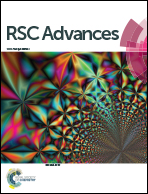Controlled synthesis of mesoporous nanostructured anatase TiO2 on a genetically modified Escherichia coli surface for high reversible capacity and long-life lithium-ion batteries†
Abstract
TiO2 is a promising anode material for lithium-ion batteries. The electrochemical performance of TiO2 can be improved by optimization of nanostructures. The present study was proposed to control the synthesis of mesoporous nanostructured anatase TiO2 on a genetically modified Escherichia coli surface. A recombinant protein INP-SiliSila containing functional domains of silicatein-α and silaffin was constructed and expressed on the E. coli surface. Deposition of the TiO2 precursor was facilitated by INP-SiliSila on the E. coli surface. Upon calcination, TiO2 coating on the E. coli surface transformed to anatase and formed well-defined rod-shaped particles. The electrochemical performance of the as-prepared anatase TiO2 as anode electrodes was improved and better than that of most reported ones. The present study not only provides an organism-based approach for fabricating nanostructured anatase TiO2 with enhanced electrochemical performance, but also opens a new avenue to take advantage of genetically modified bacterial surfaces in the synthesis and structure control of materials.


 Please wait while we load your content...
Please wait while we load your content...